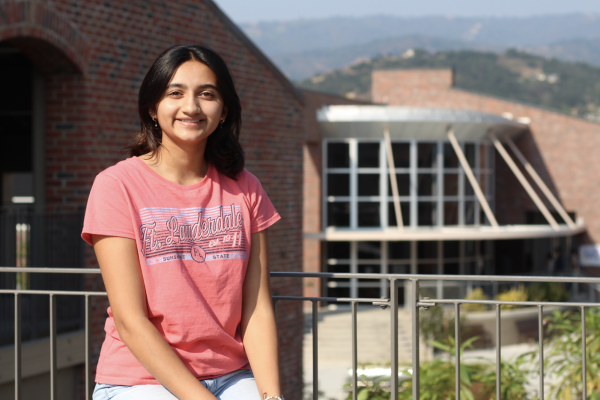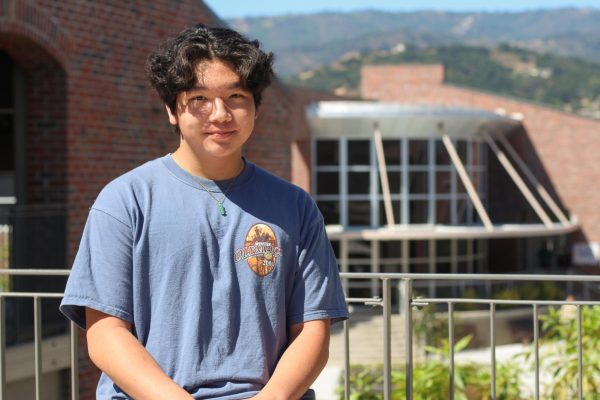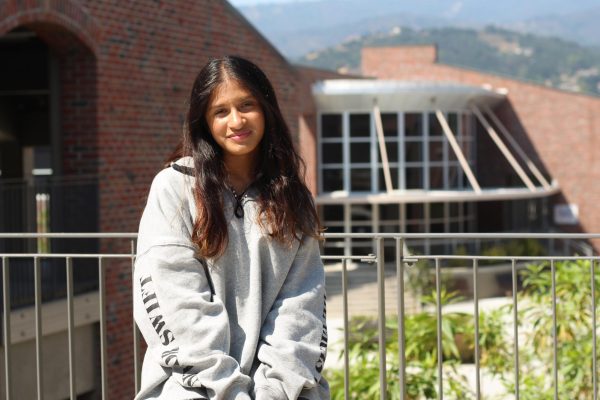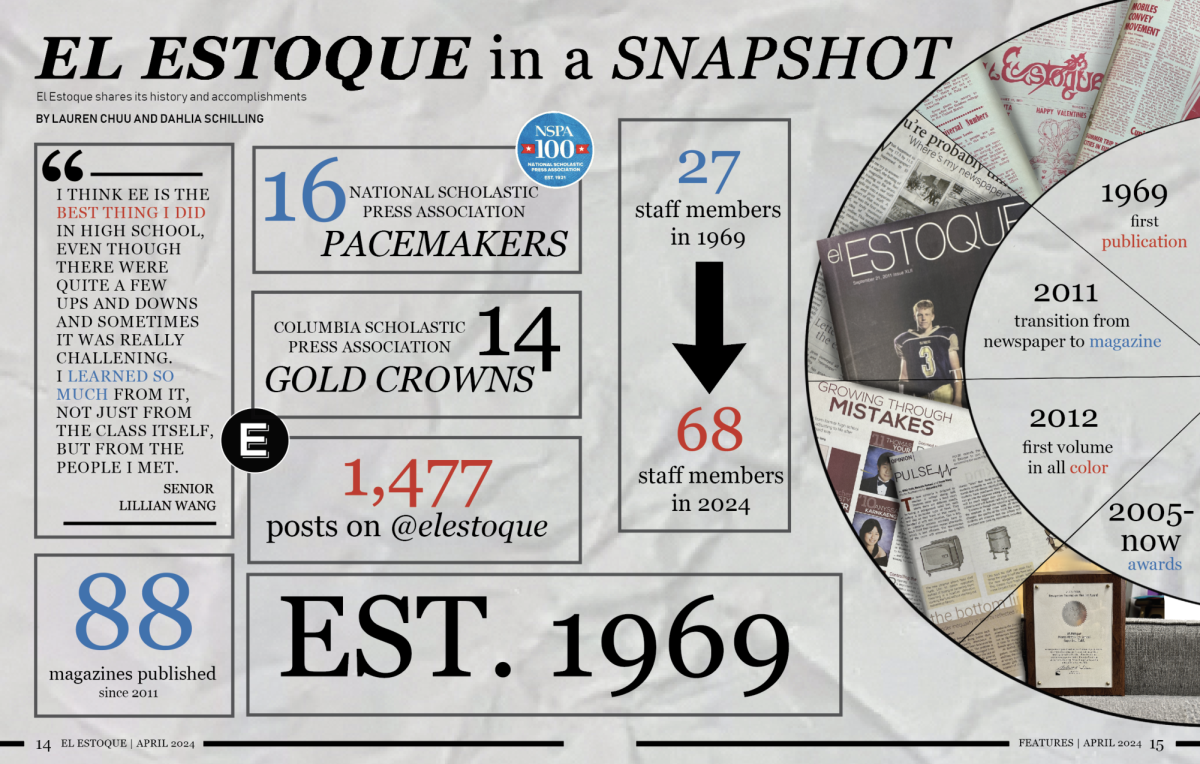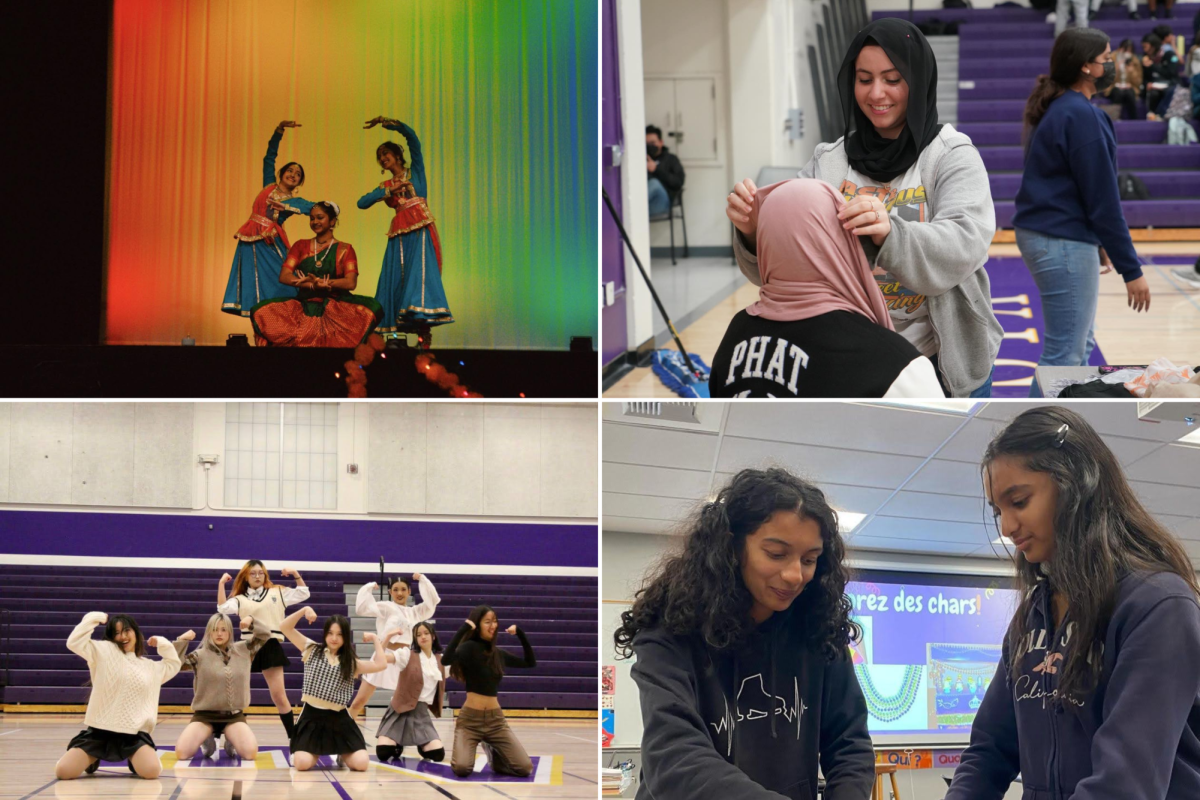EE: Hi guys, my name is Ananya Chaudhary, I’m Dylan Nguyen. And I’m Aashi Venkat, and today we’re going to be talking with Pete Pelkey, who is an Economics teacher at Monta Vista. Before he became an economics teacher, he had a variety of jobs, all of which influenced how he teaches today and the way he perceives the world. So let’s hop right into it. We’ve heard a lot about your past and some occupations that you have held. Do you think you could maybe give us a brief overview of the jobs that you have had?
PP: I had a lot of jobs. I don’t even remember all the jobs I have in the past. Sometimes I pass a place and go, ‘Oh, I used to work there.’ I started working when I was 16. I had a paper route. When I was 18, my parents basically said, ‘If you don’t have a job two weeks after graduation, you can live on the street. We’re done with you.’
And so then I had to get a job at Taco Bell because it was the first place that hired me. And then I worked my way up the chain of command to be the assistant night manager of Taco Bell. Later on, I transferred over and I painted Taco Bells for a while. And then I worked for an ice cream parlor for a while as a busboy and dishwasher. And then I worked at Carl’s Jr.’s for a while and then I became an ambulance driver.
Then I was a paramedic and then I was a chauffeur and then I worked for the funeral home. And then I sold investments for a while. And I know I’m leaving something out, but I can’t remember which one I’m leaving out that I did. Oh, I drove buses for a while, basically if it’s an automobile or anything, I could probably drive it.
I’ll eventually work for Pepsi, I worked for Pepsi for about 18 months. I must’ve done other things. I don’t remember them all. And then eventually I kind of fell into teaching.
EE: What was your most memorable job that you’ve had and how long did you work?
PP: The most important job I had, the job that defined me was being a paramedic.
EE: What was your craziest experience as a paramedic?
PP: The weirdest one was, when the train, the auto versus train, and we rolled on an auto versus train. You never get to that scene when you roll on an auto versus train because the person’s always dead. So you wait for them to, you’re on the thing, it’s two o’clock in the morning, it’s cold, you don’t want to get out of the ambulance, you want to go back to bed, you go, ‘OK, will the policeman just tell us this lady’s dead or person’s dead, person’s dead, person’s dead.’
We get to the scene and he says the sheriff is there. And I go, ‘Is the person dead?’ They go, ‘You got to see this.’ And I’m like, ‘Why do I have to see this?’ They go, ‘You just got to see it.’ So I get out and I walk over and there’s a train hit a car and had ripped the front of the car off in the front of the car was 40 or 50 feet up with the end of the train and she was sitting there and she had her feet on the tracks and she was holding on to her steering wheel.
There was nothing attached to the steering wheel. The steering wheel had sheared off, so she held it so tight it had ripped off. She just was sitting there so I go, ‘Can you hear me?’ She goes, ‘Uh huh.’ And I go, ‘Uh, do you know what happened?’ I’m taking her pulse, I’m taking her respiration, I’m taking her pulse, and she’s still sitting in the car, half of the car, the other half of the car is up.
She goes, ‘I think I got hit by a train and my husband’s going to kill me because I wrecked the car’ and she didn’t have a scratch on her. And I’m looking at this, I’m looking at this woman, I’m going, this is a miracle. This woman should be dead. There should be no girl. She should have been sucked into this train and gone.
 So we took her over. We didn’t take her to a hospital because there’s no reason she wasn’t hurt. So we took her to a phone booth and she called her husband and he came and got her. We waited for a while until he got there. And I’m thinking afterward that I should have just taken her down and got her a lottery ticket. Cause she had just beat any kind of odds you could probably set for any — hit by a train, not a scratch. And she probably would’ve won the lottery that day and I would’ve had a lot of money, but no.
So we took her over. We didn’t take her to a hospital because there’s no reason she wasn’t hurt. So we took her to a phone booth and she called her husband and he came and got her. We waited for a while until he got there. And I’m thinking afterward that I should have just taken her down and got her a lottery ticket. Cause she had just beat any kind of odds you could probably set for any — hit by a train, not a scratch. And she probably would’ve won the lottery that day and I would’ve had a lot of money, but no.
So that was probably the odd, I mean that’s, but all these odd things happen to you and it’s just a daily occurrence of, you live in a bubble. And so you live in your bubble and you think everybody lives in your bubble and ain’t nobody living like you in your bubble. And then when you’re a paramedic, you walk into everybody’s bubble on its worst day and you walk into this stuff and you go, ‘Whoa,’ and you have to handle, you have to bring order to the chaos.
That’s the situation. And so everything is chaotic. Everything is strange. You go, ‘I can’t believe that happened. Why would somebody do that?’ And those kind of things. And you do it all the time and you just how you, and then you try to manage it and get it to the hospital and make sure that person’s gonna be OK.
That defined me as a human being, and that defined me about rules. How do you, if you obey all the rules and the patient dies, should you have obeyed all the rules? So I’ve never obeyed rules after that. Like I obey some rules that make sense and other rules like, ‘Eh, who cares?’ It really changed my priority of what life is like.
I’m still just a paramedic who teaches. I’m not a teacher. I don’t see myself as a teacher. It’s not my identity.
EE: And then you talked about how, um, like right now you’re a paramedic who’s a teacher. I was wondering if you could expand a little bit more on that and also talk about how being a paramedic has impacted how you teach versus like how you treat your students and things like that.
PP: OK, first off, because of many teachers, if teaching is your first big job, which many of these people it is, they have their identities as teachers. So they always talk in the teacher’s voice. ‘Hello, kids, we’re going to do this today.’ And there is a human being there, but you only see the teacher part.
 I put the hat on and I become the teacher. ‘We’re going to talk about this now. And then I take the hat off and I talk to people like they’re human beings, which is a very different way in which I relate to people. Many teachers get all stressed out, they always say, ‘Oh my gosh, this is such a stressful job.’
I put the hat on and I become the teacher. ‘We’re going to talk about this now. And then I take the hat off and I talk to people like they’re human beings, which is a very different way in which I relate to people. Many teachers get all stressed out, they always say, ‘Oh my gosh, this is such a stressful job.’
I’m like, nobody ever dies. This is not stressful. They all get up and walk out. What’s the worst thing that happens? ‘They came tardy today.’ I’m like, ‘come on.’ Nobody’s got a metal bar through their head. It’s all good. And so it’s just a different way of looking at it. And so you see it differently, that I see it much differently than other teachers do.
EE: OK, on a different note, what was another memorable job you have and specifically something that was way different than being a paramedic?
PP: Working for the funeral home, but that’s just, you know, that’s what ends up when you’re a paramedic. But anyway, working at a funeral home was really fun. It’s a much more fun job than you think it would be.
You always dress nicely. You’re always, the music’s always beautiful. There are always beautiful flowers around you. Caskets are actually very attractive. You’re driving around in good cars and you get to scare the hell out of doctors. Cause you walk into a, you walk in to get the death certificate and you go, ‘Doctor, nobody dies from this.’
And they go, ‘What do they die from?’ And then you have to go, ‘This is not a correct diagnosis of death.’ People die from heart failure, secondary to pneumonia. They don’t die from pneumonia. Right. And you said, so then you have to, and they get really sad when they see you, they get very scared because you’re, you’re evidence of their failure, which is kind of fun.
And so, you actually, you’re kind of like an actor. You got to go through the, you have things you go through. There’s litany you have to say, you have to move a casket into a church. You, you see the people and then you walk out and you don’t really, you’re not really emotionally attached to most of these people.
So you go, ‘OK, let’s go get donuts.’ And then you get the donuts and you come back and then you’re serious again. You go back into the scene. What I realized when I was doing this, it’s how important rituals were for people to mourn and that really what I was facilitating was the people mourning in ways that were appropriate for their culture or subculture of America. And it was actually really fun.
EE: So from all your occupations, how did you end up teaching?
PP: It was an accident. I wanted to go to law school. I went to law school for a year, but I went to my parents who didn’t pay for my college education and I said, ‘Hey,’ and they had money. And I’m like, ‘Could you pony up for law school a little bit here?’ And they go, ‘No.’ And I went, ‘Thanks.’ And they went, but will my, my dad had been a principal, my mom, a teacher. And they go, ‘Why don’t you become a teacher, and then you can just sit behind your desk and study your law and then you’ll become a lawyer, and then you don’t have to be a teacher anymore.’ And I was like, ‘OK.’
So I went to, I went to teaching school and became a teacher and then I got in and I was doing law school, but I was also, I was teaching at Lynbrook at the time and I was teaching during the daytime. I was coaching in the afternoon and then I went to law school at night. And it was OK, but then I realized through several experiences that I didn’t want to be a lawyer and then it seemed like I was spending a lot of money not to be a lawyer, even though I was doing really well in law school, I would have passed the bar.
But I didn’t want to practice law. And so I didn’t have that kind of money. So then I realized, unfortunately, the children would always give me the, ‘You have to stay here until my little sister goes too, she has to have you,’ ‘How old, how young is your little sister?’, ‘Two.’ I’m like, ‘OK.’ And so they just suck you in. And then you just do this for years and years and years and years and years and years and years. And all of a sudden 36 years gone by.
EE: Is there one lesson you’ve learned from any of your past jobs, including teaching, that you would want most people to know?
PP: The scariest thing about you people is that we’ve taught you everything wrong.
The secret to life is to have a life. We really need to teach you that there are much more important things than getting a job, than going to a good school, that there’s, you got to find what’s right for you and it’s going to be different for everybody and that’s the key. The worst thing, the thing that scares me to death is that you will go to the right school because that’s what you’re supposed to do and you’ll get a good job because that’s what you’re supposed to do.
And you’ll come back to Cupertino and live with your parents until it’s time to get married and then you’ll get the husband or wife because that’s what you’re supposed to do. And then you’ll pop out the babies because that’s what you’re supposed to do. Buy the house because that’s what you’re supposed to do with the help of your parents.
And then when you’re my age, you’ll look back at your life and go, ‘What the hell have I done? I hated my job. I hate my husband. I really don’t like these brats that I produced. I have wasted my life and this is my one shot at life.’ And that’s not worth doing. Life is worth living and finding something worth every day getting up and going, ‘Yeah, this is kind of cool.’I have a happy life and everything in my life has been miserable. It’s just how it works. I’ve done so many things that did not work out and haven’t, didn’t work out the way I thought they would. There’s no vision of what I, you know if they’d said, ‘This is your, this is how your story arc of your life is going to go,’ I would have laughed at you when I was 17. But this is the way it’s gone. But the good thing that I learned very young, or I think about my life, is I learned that I have to live. That I need a life that’s worth living. And that’s, I don’t know, you gotta find that, what your answer is for yourselves. But, you gotta start looking at life and not worry about impressing everybody with your status.

Because status is vacuous. It disappears as soon as somebody looks down on you.
EE: Thank you so much Mr. Pelkey for joining us today, and giving us insight into your peculiar past. We hope you all enjoyed, thank you for tuning it.




















